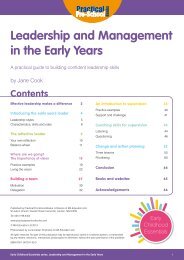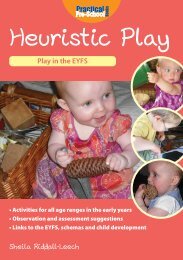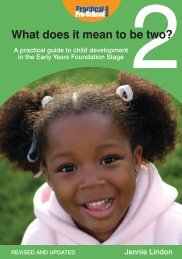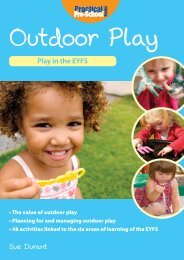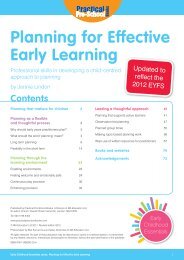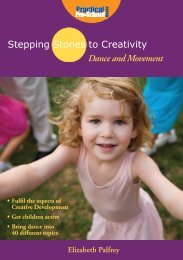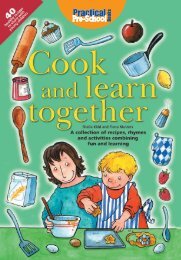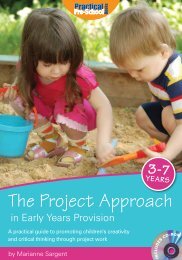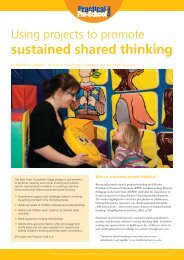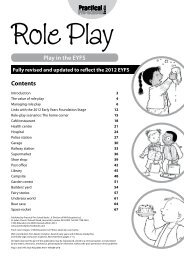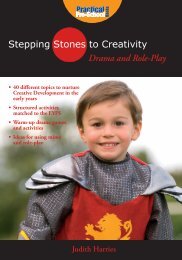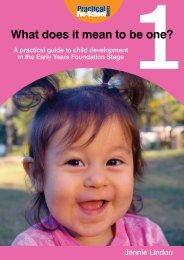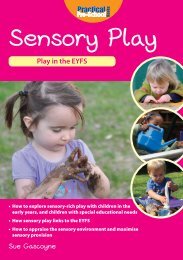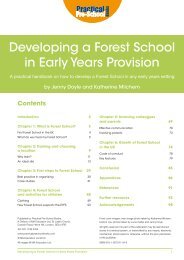Planning for Effective Early Learning - Practical Pre-School Books
Planning for Effective Early Learning - Practical Pre-School Books
Planning for Effective Early Learning - Practical Pre-School Books
You also want an ePaper? Increase the reach of your titles
YUMPU automatically turns print PDFs into web optimized ePapers that Google loves.
Chapter 1<br />
<strong>Planning</strong> as a flexible<br />
and thoughtful process<br />
Why should early years<br />
practitioners plan<br />
<strong>Planning</strong> does matter; a developmentally appropriate approach<br />
to planning can make a positive difference to the experiences of<br />
young children. However, the reflective approach that needs to go<br />
hand-in-hand with planning starts with this question: “Why plan”.<br />
Asking “Why”, or “What <strong>for</strong>” if you prefer, addresses the best list<br />
of priorities when planning <strong>for</strong> young children’s learning.<br />
The top priority should be that early years practitioners give<br />
time and energy to planning in order to benefit the children. You<br />
consider what you offer and in what ways, because you are<br />
committed to providing experiences that are developmentally<br />
appropriate <strong>for</strong> babies, toddlers and young children. You give<br />
energy to getting to know individual children so that anything<br />
you plan will be well suited to their age, ability and current<br />
interests and preferences. You avoid any kind of planning that<br />
rests upon a one-size-fits-all philosophy.<br />
Close behind the benefits to children as an answer to “Why” should<br />
be a focus on the adults who spend their days with young children.<br />
Close attention to planning will enable you and your colleagues<br />
to keep your knowledge of child development fresh. A sensible<br />
approach to planning will allow you to revisit your expectations of<br />
what children might be able to do, as well as what are realistic next<br />
steps. As a professional the planning process is a good way of<br />
keeping you aware of all aspects of development and ensuring that<br />
some potential areas of learning do not push aside others.<br />
PoInt <strong>for</strong> rEfLECtIon<br />
What does useful planning look like<br />
What might happen if early years practitioners did<br />
not bother to plan ahead in any way at all Children’s<br />
experiences with you over early childhood could be very<br />
limited. However much young boys and girls would love<br />
to cook, their familiar adults would never have got around<br />
to organising the ingredients, or even better, going out<br />
together on a shopping trip.<br />
A great deal depends on what practitioners mean by the<br />
word ‘planning’. <strong>Planning</strong> to be able to cook will not be<br />
enjoyable if, in practice, this means children are waiting<br />
while the adult does almost everything. Then they are<br />
allowed to decorate the finished product – and every child<br />
will make a fairy cake whether they want to or not.<br />
There is plenty of space <strong>for</strong> discussion between the two<br />
extremes <strong>for</strong> planning. Young children do not enjoy, nor<br />
benefit from, a highly regimented day or session. On the<br />
other hand, they are not well supported by practitioners<br />
who pass by good opportunities out of fear of ‘interfering’<br />
with children’s play.<br />
in practice no more than written plans – pieces of paper, which<br />
may have no benefit <strong>for</strong> young children at all.<br />
The answer to “Why should we plan” should never be “To<br />
keep the inspector happy” nor “because we have to”. You do<br />
not plan an activity exclusively, or mainly, to meet the goal of<br />
showing another adult that you have plans. This answer to the<br />
“Why” question, and the anxiety that usually underpins it, is a<br />
warning that practitioners have been persuaded into believing<br />
that planning is not a thoughtful process. Instead, planning is<br />
What should the word<br />
’planning’ mean<br />
<strong>Planning</strong> is an active process, either working as an individual,<br />
thoughtful practitioner, or when a small group of people get<br />
<strong>Early</strong> Childhood Essentials series: <strong>Planning</strong> <strong>for</strong> <strong>Effective</strong> <strong>Early</strong> <strong>Learning</strong> 3



